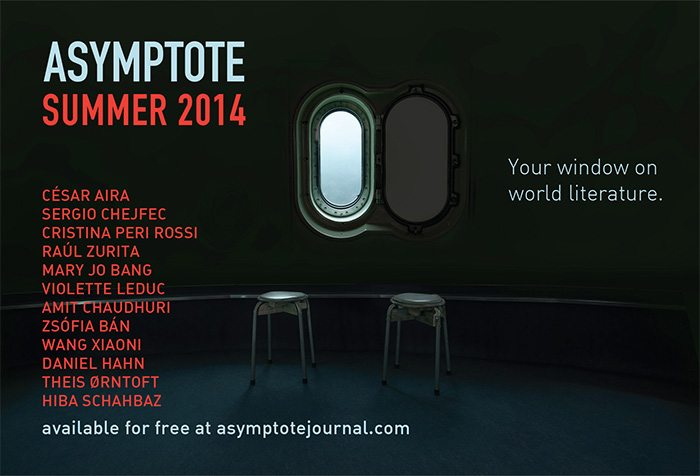You won’t see her on any wanted posters, but literary police officers have made a composite image of Russian femme fatale, Leo Tolstoy’s Anna Karenina (the endeavor reminds us how little we know about our favorite characters’ physical appearances—and why things are better that way). Anna’s popularity came as quite the surprise to many Russian readers at the time, who thought Tolstoy was just too, well, Russian to garner much readership outside his native country. READ MORE…
Posts by Patty Nash
Weekly News Roundup, 15th August 2014: Anna Karenina’s Face; Happy 30th, Dalkey!

This week's literary highlights from across the world
Weekly News Roundup, 8th August 2014: Slang-xplaining, Winning Prizes and Judging Them

This week's literary highlights from across the world
Prescriptive grammarians may enjoy this, even if it destabilizes their strict sense of right and wrong: Slate has detailed the 250-year-long grammatical quibble over the correct use of “hopefully,” that ever-present eye twitch of incorrect adverbial usage. Also related: the same website explains why certain adjectives just sound right in one way, and not the other. If your eyes aren’t tearing up with that twitch yet, take a look at io9′s ambitious compilation of the most disastrous typos in Western history.
Meanwhile, in the same spirit of chronological grammar-mapping, The Atlantic has compiled a web app history of the New York Times’ stiff slang explanations (example: “Diss, or a perceived act of disrespect”). And the game-side disputes can finally end: Scrabble has added over five thousand new terms to its updated player dictionary, including such witticisms as “sudoku” (shouldn’t that be a proper noun?), “buzzkill,” and “vlog.”
July Issue Spotlight: Sergio Chejfec’s “The Witness”

A close look at Sergio Chejfec's masterful not-quite fiction, non-quite essay, "The Witness"
Patty: The phrase “of-the-moment” is so annoyingly trite, but for lack of a better expression, Sergio Chejfec is perhaps one of today’s most of-the-moment writers, and the short fiction/systematic essay-musing “The Witness”—translated by Steve Dolph and published in Asymptote’s July issue as part of our Latin American feature—proves beyond a shadow of a doubt just why that is.
They say, more or less, that anyone who’s made the mistake of leaving can’t make the mistake of returning. READ MORE…
Krumping in Translation: Interviewing Aditi Machado, Asymptote’s Poetry Editor

On reading translated poems: "It’s a dangerous, unsettling world—that’s why it’s fun."
Asymptote’s poetry editor Aditi Machado has curated across the gutter and five continents. In light of Asymptote’s July issue, I interviewed Aditi, and her responses run the gamut: what follows is an in-depth interview with insight into arranging an issue, poetry in translation, and embracing vulnerability when reading.
Many think that reading poetry requires a specific literacy—is the same true for reading translation, or poetry in translation?
Reading anything requires specific forms of literacy, even reading a newspaper. With poetry, I think we’re less aware of skills we may already have or of those that may be gained. Additionally, we’re extremely sensitive about our lack in these skills—or, if we feel we do have them, we might be able to articulate how we learned them and how much further we have to go. It’s a special privilege, being literate about one’s literacy. READ MORE…
Weekly News Roundup, 25th July 2014: Bookin’ it, Icy lit

This week's literary highlights from across the world
The Man Booker Prize decision to include all English-language pieces of fiction (not just those in the Commonwealth or Ireland) caused quite a stir last year. Since the longlist has been announced, take a look at what it means to include writers from the United States among the Bookish. That being said, the English novel as we know it is dying, or dead already (for better or for worse: doesn’t this mean new opportunities for translated lit)? And another English-language prize, longlisted: the so-called “International” Dylan Thomas Prize has announced those in the running for the 30,000-pound award. READ MORE…
Weekly News Roundup, 18th July 2014: New Asymptote, so many prizes!

This week's literary highlights from across the world
Unless the underside of a rock is the roof of your home, chances are you’ve already checked out Asymptote’s stellar July issue. This summer’s pickings include some of the greatest: César Aira, Sergio Chejfec, Raúl Zurita, and Christina Peri Rossi figure as highlights from our sparkling Latin American feature. And elsewhere, the sights are no less spectacular: French author Violette Leduc, blog alum Faruk Šehić, and translators Daniel Hahn and J. T. Lichtenstein. READ MORE…
Hot off the e-press: Asymptote’s July issue is now live! The star-studded issue reads like a cool glass of water, and with good reason: the cold-as-ice cover is inspired by Latin America, currently in the dead of winter and the subject of this issue’s special feature.
Highlights in this Latin-American edition include writerly tributes to Osvaldo Lamborghini (by César Aira), Julio Cortázar (by Sergio Chejfec), and Gabriel García Márquez (by the legend’s very own Portuguese translator Eric Nepomuceno), alongside poetry from Chilean prizewinner Rául Zurita and fiction by Uruguayan author Cristina Peri Rossi. We’ve even got a video trailer for them!
Weekly News Roundup, 11th July 2014: Pet peeves, Tyra Banks, PEN awards

This week's literary highlights from across the world
Canadian author Margaret Atwood is known for her take on speculative fiction, and her latest op-ed-cum-fiction piece proves no exception: in it, she imagines what the Arab-Israeli conflict would look like to a Martian. Similarly problematic is the imminent republication of Adolf Hitler’s autobiography, Mein Kampf. At the New York Times, Peter Ross Range reflects on what it means for Germany to have the book in circulation for the first time since the end of World War II. READ MORE…
Weekly News Roundup, 4th July 2014: Football fandom, 50 poems of love

This week's literary highlights from across the world
If you’re in the United States: Happy fourth of July! Same goes to our readers elsewhere, though the fourth might be happy for different reasons…
Americans mourning a soccer loss: what a novel idea! Here’s how the United States turned a corner in football fandom. Sports aren’t really our thing, though: we’re more into Three Percent’s ongoing World Cup of Literature project, or Electric Literature’s suggestion to read a book for every remaining World Cup team. READ MORE…
Weekly News Roundup, 27th June 2014: Bilingual immorality, soccer on the brain

This week's literary highlights from across the world
Remember the “trolley problem?” (Should you kill one person in order to save five?). If it seems like your moral compass is irrefutable, you’re wrong: the ethical judgement you make depends on the language in which you are called to make it.
Shadowy truths: the origin of Yiddish is nebulous, and it may remain so indefinitely. At Tablet, the latest in an ongoing series examining how the academic field is destroying its own attempt to map an etymology. More verboten things: the Moscow Times takes a peek in a Soviet Union-era erotica collection.
Weekly News Roundup, 19th June 2014: World Cup in Books, New Neruda

This week's literary highlights from across the world
(Re)discovering familiar authors. Those familiar with Chilean poet Pablo Neruda (that is to say: everybody) might be happy to discover that more than twenty previously unknown poems have been uncovered and are slated for publication later this year in Latin America (no word on translations quite yet).
Big, big news in letters across the globe (especially for us Asymptote-fans): the shortlists for the PEN Literary Awards have been announced, and the translation categories are peppered with our very own past contributors. In the prose category, Vasily Grossman’s An Armenian Sketchbook sports a nomination. You can read an excerpt from the novel, translated by Elizabeth and Robert Chandler, in our January 2013 issue! And Asymptote alum and professor Michael Hoffman is up in the same category for his translation of The Emperor’s Tomb by Joseph Roth (read his essay on Wolfgang Koeppen in our January 2014 issue here). We like to see our past contributors doing big things: Reif Larsen, frequent contributor and goofy Asymptote friend, writes in The Guardian on the trials of seeing his first novel receive the Hollywood treatment.
Weekly News Roundup, 13th June 2014: Soccer/Football Inspiration, Stroking Our Egos

This week's literary highlights from across the world
Without a doubt, you’re reading this from a screen, and probably the only thing you’re smelling is your morning coffee. But now chemists have quantified and explained that long-coveted “old book smell,” for better or worse… Some old books, like 19th-century French writer Arsène Houssaye’s Des destinées de l’ame, are bound in human skin (ew). Good news if you’d prefer to stick to the scanned: HathiTrust, the scannable digital library, has won the court case permitting the agency to continue uploading books for those who cannot read them in person.
Colombian novelist Juan Gabriel Vásquez has scored the prestigious IMPAC Dublin Literary Award for The Sound of Things Falling (translated by Anne McLean, who snagged 25 percent of the award’s cash prize!). The newest United States Poet Laureate has been announced: Charles Wright, Pulitzer Prize winner and translator of Italian writer Eugenio Montale, will preside over the country’s most eminent poetic spot.


